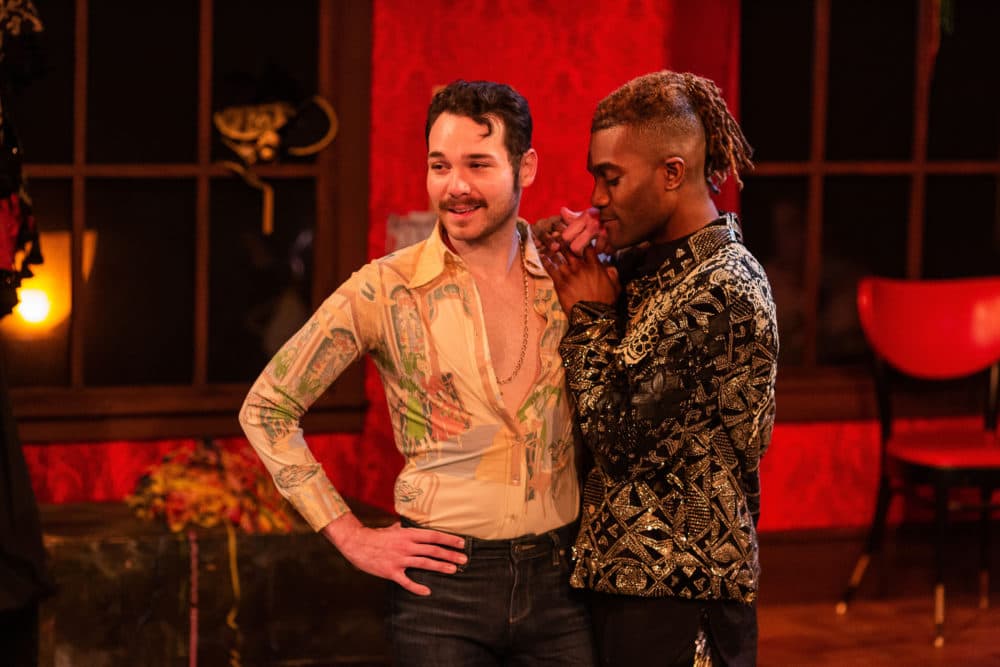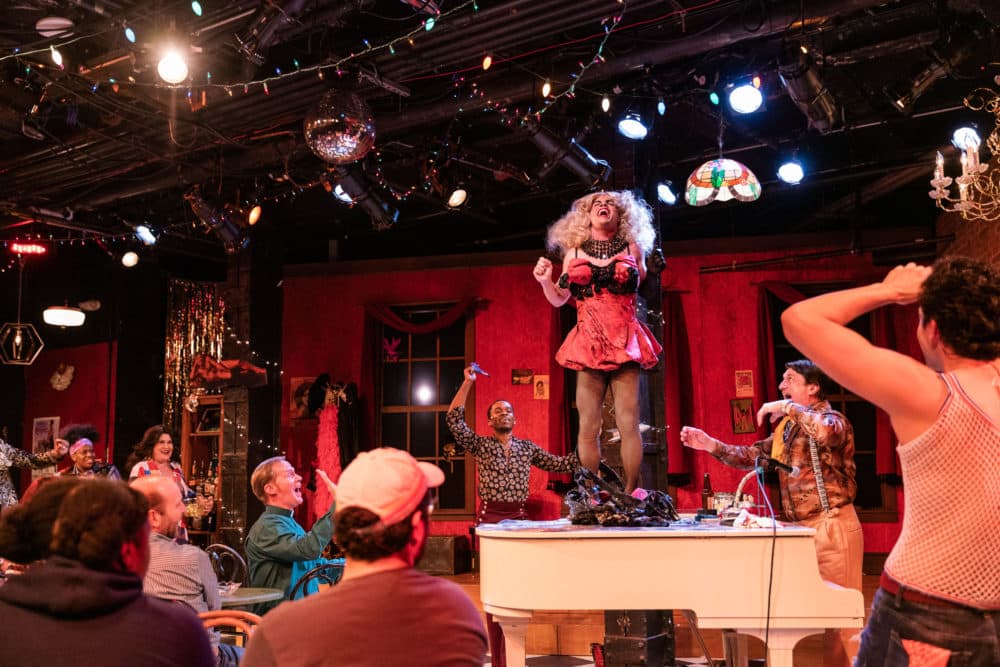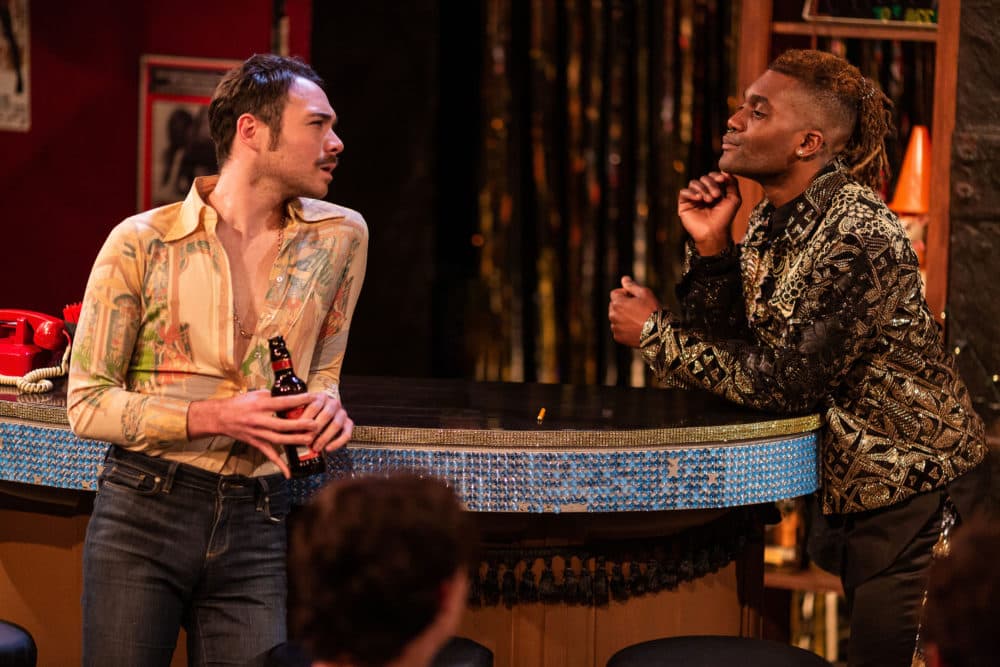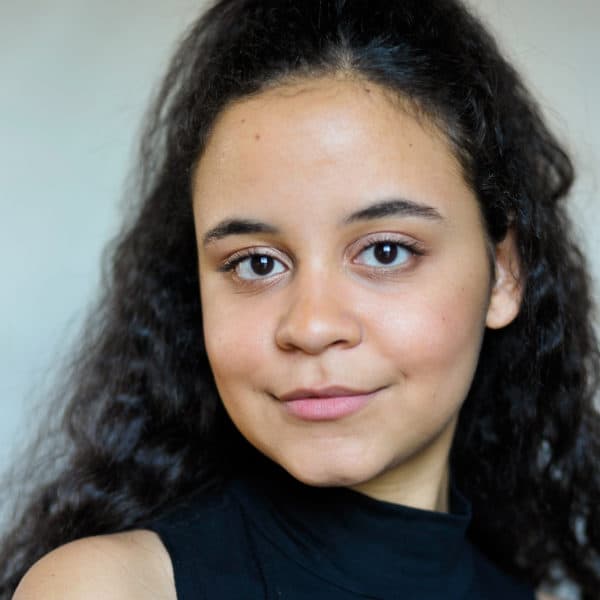Advertisement
At SpeakEasy, An Intersection Of Modern And '70s Gay Culture

One summer evening in 1973, a blazing fire ripped through a vibrant gay bar in New Orleans. The fire was set by lighter fluid and its destruction took the lives of 32 people in just minutes, making the arson attack on the UpStairs Lounge the deadliest attack on a gay bar in U.S. history before the Pulse Nightclub shooting in Orlando, Florida in 2016. The media neglected to diligently cover the horrific incident, and therefore the UpStairs Lounge has faded into the shadows of other prominent moments in LGBTQ+ history.
I have to admit, I had never heard of the firebombing of the UpStairs Lounge before encountering Max Vernon’s musical, “The View UpStairs,” which opens at SpeakEasy Stage Company this week.
Director Paul Daigneault was first drawn to the musical for its celebration of the history of gay liberation, but found that the beauty of the story lies in its emphasis on the human need for community. Today, “we don’t do a lot of work on one-on-one connection,” says Daigneault. “The View UpStairs” suggests that perhaps finding community starts with stripping away the facades we invent in an effort to protect ourselves.
“The View UpStairs” intersects two generations: the present moment and the 1970s era on the precipice of the gay liberation movement.
Wes, a millennial up-and-coming fashion designer with an Instagram following of 40,000, buys a shabby building in the French Quarter. He has no idea that the property was once the UpStairs Lounge, and with a stroke of theatrical magic, finds himself back in 1973, immersed in the bar’s community.
The production captures the perilous reality of queer-identifying individuals 46 years ago. The constant fight for survival and the fear of ridicule, ostracization, and death governed the lives of many, like the character Buddy, a closeted gay man with a wife and kids, played by Will McGarrahan. “I pray for a moment [...] to leave the house and not have to lie. To be myself once before I die,” Buddy sings. When Wes pops up from an unimaginable future, his unapologetic ownership of his queer identity shakes up the group. “You better stop being so wide-eyed,” they all warn him.

J’royce Jata, who plays Wes, thinks as the play as an exploration of what we can learn from those who came before us in order to appreciate what freedoms we have today, and still serve as a sobering revelation of the work that lies ahead. It’s an “effort to honor those who have made our lives fiercer,” says Jata.
In musical theater, “we rarely get to see a gay black lead; one that goes on a journey of self-acceptance and self-love. It was the first time I really saw a part of myself in a craft that I had been studying my entire life,” Jata adds.
Although Jata admits that there are times when “I think I know everything,” (they proudly own that they are a triple Leo with a lot of fire in their astrology chart), there are sides to Wes that were challenging for them to grasp. In his first song, Wes sings, “I’ll make a million dollars and prove once and for all that I’m not a basic bitch,” which pretty much sums up his priorities as an influential designer in the age of hashtags and likes. Jata calls Wes’ superficial persona his “plastic energy.” Perhaps, a lot of us can relate to the pressure to establish a social media image that makes our lives seem carefree and practically perfect.
But travelling back to the '70s invites Wes to abandon the guise and convenience of his iPhone after two bar-goers smash it because it might be dangerous “surveillance technology.”

SpeakEasy’s production joins queer actors of different generations and experiences. Jata and McGarrahan both expressed that collaborating with artists who approached the work from unique perspectives was the highlight of the process. “I’m constantly learning from younger people and I’m surprised that they are learning from me. You see people come to an understanding,” says McGarrahan.
A lot has changed since the UpStairs burned, but the world still feels precarious and the future uncertain. McGarrahan says, “We’ve all come from somewhere and we have a responsibility to where we are going... It felt scary back then and it feels scary now and we’ll get through it and keep doing the best [we] can.”
The intersection of now and then sparks a conversation about what it costs to cover up one’s truth. “Authentic connections of the heart will keep the human race moving forward,” says Daigneault. It’s when we dare to shed our protective armor that we are able to foster understanding and community.
